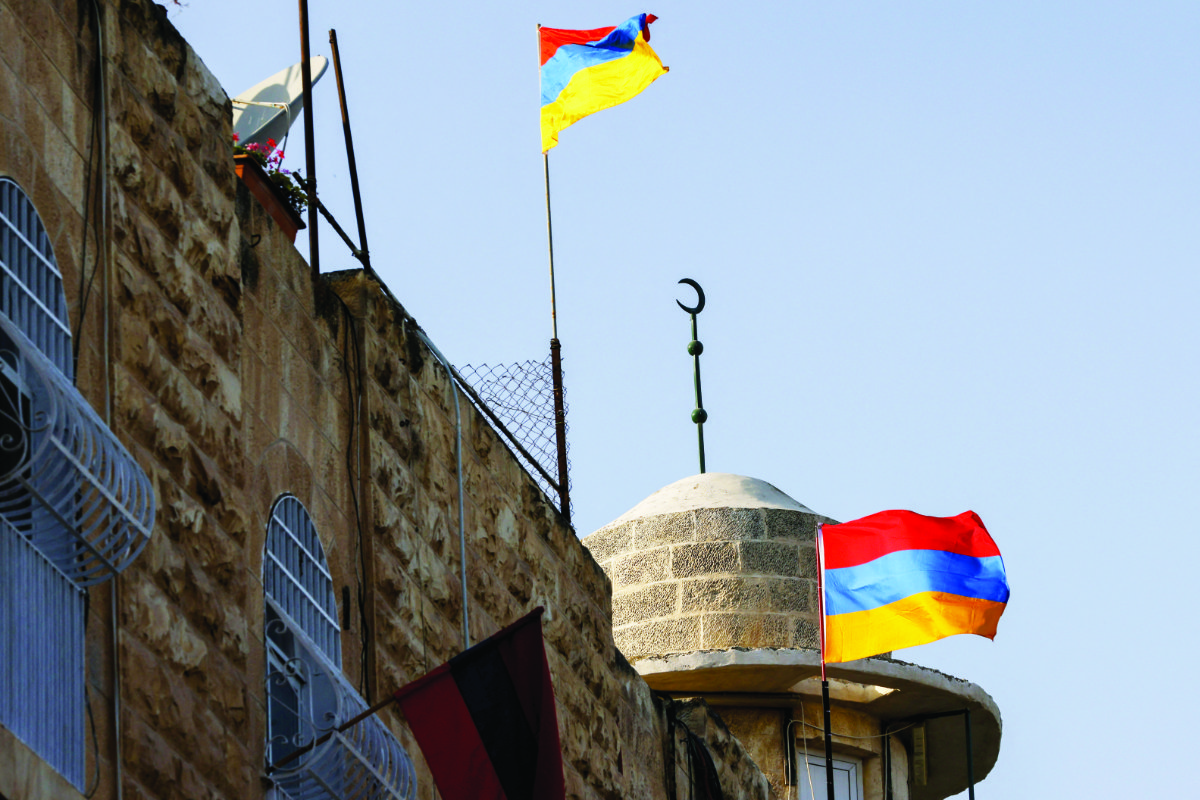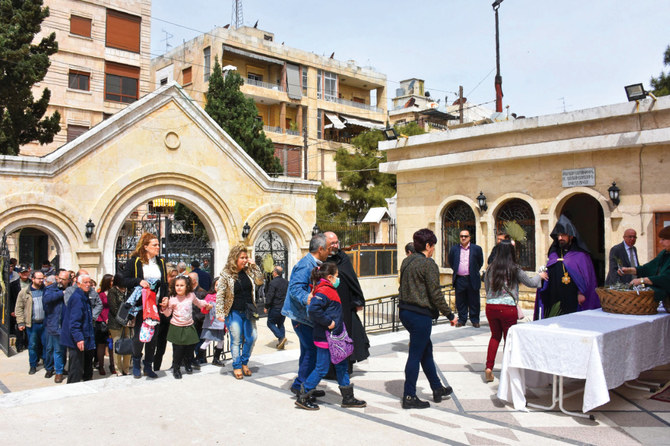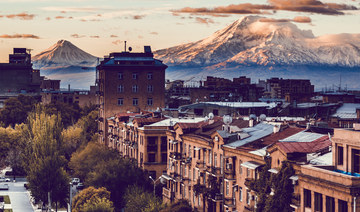LONDON: When Armen Sarkissian, the president of Armenia, stepped off his plane in Riyadh in October this year, he became the first president of the small, former Soviet republic to visit Saudi Arabia.
For nearly 30 years, since Armenia declared its independence from the former Soviet Union in 1991, there have been virtually no diplomatic relations between it and some Islamic countries.
One reason for the absence of ties is the long-running Nagorno-Karabakh dispute, which, on the face of it, pits Christian Armenia against Muslim Azerbaijan. This, along with the Armenian genocide of 1915 by Ottoman Turks, dominates Yerevan’s relations with many Middle Eastern countries.
Geopolitically, the continued presence of several thousand Russian troops in Armenia has ensured the country remains firmly within Moscow’s sphere of influence, leaving successive governments with little room to maneuver.

The first Armenian presidential visit to Saudi Arabia since it achieved independence. (AFP)
Beyond politics, however, relations between Armenians and Arabs, especially on a personal level, have been a good deal closer. Indeed, Armenians have been seeking their fortunes and finding sanctuary in Arab countries for centuries, for the most part harmoniously, albeit often as members of a low-profile community.
Armenia, a country of 3 million, is a small land-locked state, plagued by earthquakes and hemmed in by Turkey to the west, Georgia to the north, and Azerbaijan to the east. Yerevan, the capital, is a Tsarist gem with an overlay of Soviet kitsch and striking modernism.
The ruins of the medieval capital at Ani bear testament to the fact that, before the First World War, Armenians lived west of Mount Ararat across much of eastern Turkey. But the events of 1915 (and before) propelled tens, if not hundreds, of thousands of Armenians into a diaspora to the south.
There they found a warm welcome in the cosmopolitan cities of the Levant among existing communities of their compatriots.

Armenians were major builders in the Ottoman Empire. (AFP)
Armenians were famous builders. Indeed, Sinan Pasha, the great architect of the Ottoman Empire, was reportedly of Armenian heritage. Many in the diaspora carved out niches as middle-men, translators, bankers and merchants. One such character, a Mr. Youkoumian, is an anti-hero of Evelyn Waugh’s comic novel “Black Mischief,” set in a fictionalized Ethiopia in the 1930s.
The Armenians were able to maintain their identity through the Ottoman Empire’s millet system and later through the colonial mandates. Under these systems, payment of taxes and settlement of personal status disputes involving births, deaths, marriage and inheritance were devolved to religious leaders.
As such, the Armenian bishops and archbishops were responsible for the behavior of their communities. From Aleppo to Cairo, from Basra to Beirut, the church was, and is, the center of Armenian life, providing welfare to the needy and education to the young.
This has resulted in a strong sense of community and identity, which was nurtured and supported by philanthropy. Calouste Gulbenkian, for instance, an early Armenian pioneer of the oil industry, became fabulously wealthy and funded dozens of Armenian schools, orphanages and churches across the Middle East through his foundation.
 For the most part, these communities were apolitical. An exception to this was the career of Nubar Pasha, a famous prime minister of Egypt in the late 19th century. He served three terms of varying lengths, helped negotiate the terms of the construction of the Suez Canal, reformed the system of consular courts under which the colonial powers maintained a parallel justice system, and managed fickle rulers such as the energetic but spendthrift Ismail Pasha.
For the most part, these communities were apolitical. An exception to this was the career of Nubar Pasha, a famous prime minister of Egypt in the late 19th century. He served three terms of varying lengths, helped negotiate the terms of the construction of the Suez Canal, reformed the system of consular courts under which the colonial powers maintained a parallel justice system, and managed fickle rulers such as the energetic but spendthrift Ismail Pasha.
Nubar Pasha’s patron, Boghos Bey, was an Armenian who became secretary to Muhammed Ali Pasha, the founder of modern Egypt. When Alaa Al-Aswany chose the title for his brilliant novel “The Yacoubian Building” he was paying homage to the Armenian contribution to Cairo.
In the eastern Mediterranean, Beirut’s Burj Hammoud is often seen as the Armenian area of the Lebanese capital. It was formed first as an area of refugee settlement after the First World War and took in thousands who had fled the massacres in eastern Turkey and northern Syria.
INNUMBERS
29,743 square km - Area of Armenia
3 million - total population according to 2011 consensus
Inland, Anjar on the Beirut-Damascus highway is also an Armenian town known for its beautiful archaeological remains and as the former headquarters of Syrian military intelligence in Lebanon.
Under Lebanon’s confessional system, Armenians are guaranteed six seats in the 128-seat parliament, but have maintained a low political profile.
To the south, the Cathedral of St James is at the center of the Armenian area of the Old City of Jerusalem, the smallest of the four quarters.
The Armenians are one of the three primary custodians of the Church of the Holy Sepulchre, reputedly built on the site of the crucifixion of Jesus Christ in the Old City. The monks in their distinctive black cowls kept the traditions of the Armenian church alive during the long decades of Soviet atheism in Armenia itself.
In Syria, Aleppo was the center of the Armenian population. The famous Baron Hotel in the city was owned and managed by the Mazloumian family. There, as a relatively prosperous minority, the Armenians are believed to have largely supported the Assad regime.
As a result, Jdaideh (New), an historic area outside the old walls of Aleppo and the quarter most associated with the Armenians, has been heavily damaged in the course of the civil war. Distressing images of old palaces and museums being blown up pervade the internet.
And in Iran, from which modern-day Armenia receives much of its energy supplies, there is the famous Holy Savior Cathedral, also referred to as the Vank, in the district of New Julfa in Isfahan.
In the early 17th century, as part of a scorched earth policy to try to head off the Turkish armies, Shah Abbas of Persia forcibly settled thousands of Armenians south of the river Zayande that runs through Isfahan. Armenians remain a sizable minority in Iran.
Today the Kardashians, Cher, Andre Agassi and Charles Aznavour, to name just a few, are famous scions of Armenia internationally. But, closer to their homeland, the Armenians have a long history as one of the most ancient and successful communities in the Middle East.


























